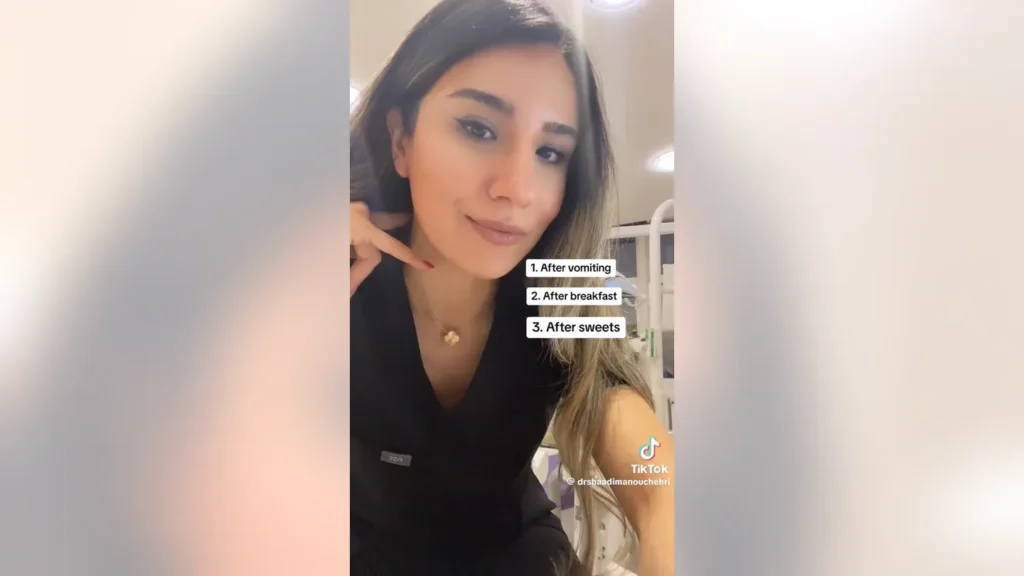A dentist has become a TikTok sensation by advising when not to brush your teeth. Dr. Shaadi Manouchehri, a noted dental professional in England, has stirred up online debates with her surprising advice.
In her popular video, viewed over 12 million times, Manouchehri advises against brushing immediately after certain events. She highlights that after vomiting, brushing should be avoided, sparking curiosity and comments from viewers.
"I literally have to brush my teeth after throwing up," one user commented. Another shared, "My mom always made me brush my teeth after vomiting." A third recounted, "Learned the first one in pregnancy! Mouthwash was my best friend that first trimester."
Additionally, Manouchehri recommends not brushing right after breakfast or consuming sweets. A TikTok viewer expressed, "Ah, yes, the three times I want to brush my teeth more than any other time."
The reason behind this advice is the acidity, or pH levels, in the mouth after these activities. "Your teeth are minerals and an acid could quite literally dissolve them," Manouchehri explained to Fox News Digital.
She detailed the danger of brushing immediately, particularly after vomiting or eating. "If you brush your teeth straightaway, you're basically rubbing the acid onto your teeth," she noted.
Eating causes bacteria on teeth to produce acid. "When we eat anything, be it breakfast, lunch, snack, sweet things in particular, the bacteria on your teeth metabolize this and turn it into an acid so that you can brush straightaway."
She reiterated the risks associated with immediate brushing post-vomiting. "Obviously, the stomach contents are very acidic. So, if you brush your teeth straightaway, you're basically rubbing the acid onto your teeth, which can damage them."
@drshaadimanouchehri #dentist #dentistry #dentaladvice #learnontiktok #funfacts #londondentist #dentalcleaning #teethbrushing #teethbrushingmadeeasy #teethbrushingtips #londondentistry #marylebonedentist #fypシ ♬ original sound - Dr Shaadi Manouchehri
Manouchehri advised waiting for the mouth's natural defenses to neutralize the acidity. This process can take between 30 to 60 minutes for the salivary buffers to act effectively.
It's challenging to resist brushing immediately after vomiting to remove the taste, but Dr. Shaadi Manouchehri suggests alternatives. Drinking water or chewing sugar-free gum can help increase saliva production and neutralize mouth acidity faster.
Manouchehri recommends waiting 30 to 60 minutes after eating or vomiting before brushing. This delay allows the mouth to neutralize the acidic pH levels. She emphasizes these times because of the common urge to brush immediately after these activities.
In the morning rush, many want to brush right after breakfast. Manouchehri has developed a routine that allows her to enjoy her meal and wait for her mouth's pH levels to stabilize before brushing.

Regarding sweets, Manouchehri explains they can also raise mouth acidity due to bacterial metabolism. "So, we eat sweets [and] the bacteria on our teeth also feed on that sweet," she said.
To manage mouth acidity, Manouchehri suggests using alcohol-free mouthwash and chewing sugar-free gum. These can cleanse the mouth and accelerate acid neutralization without harming the teeth.
Dr. Lucynda Raben from Wichita, Kansas, supports Manouchehri's advice and suggests a broader application. She advises delaying brushing after any eating, drinking, or vomiting until the mouth's pH normalizes.
Raben emphasizes the importance of waiting for the mouth's pH to reach a safer level before brushing. Immediate brushing can erode tooth enamel, similar to using a strong acid on household surfaces.
She warns against the long-term effects of brushing in an acidic environment. Over time, this can lead to significantly weakened tooth structure.
The Mayo Clinic advises against brushing immediately after consuming acidic foods or drinks. Waiting an hour allows saliva to stabilize the enamel. Other dental care tips include changing your toothbrush regularly, avoiding tobacco, and seeing a dentist routinely for maintenance.
